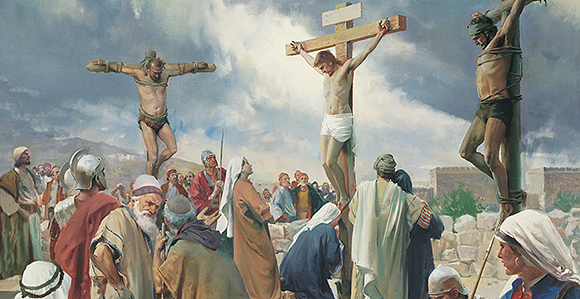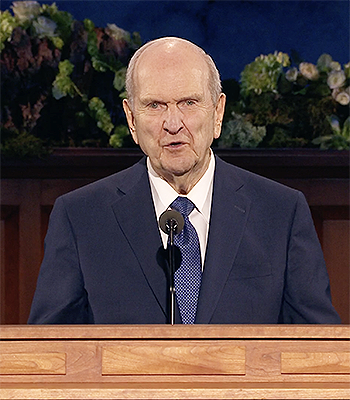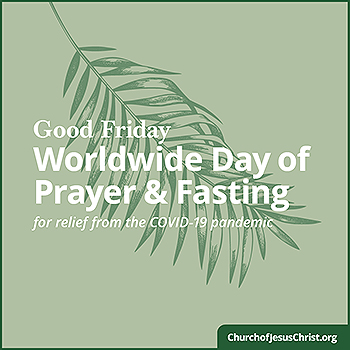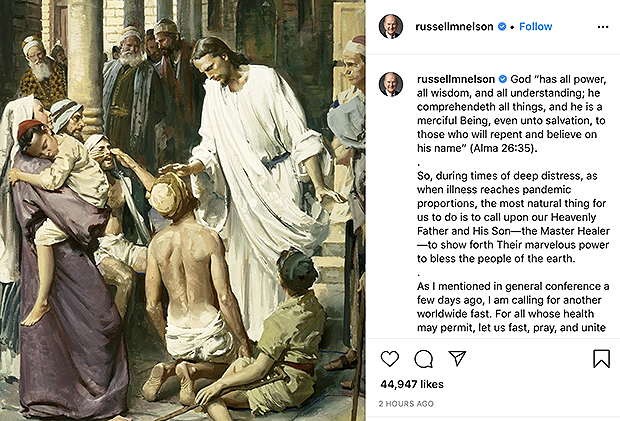Why Some of Other Faiths Accepted President Nelson’s Invitation to Fast on Good Friday
Contributed By Jason Swensen, Church News staff writer

Good Friday commemorates the crucifixion and death of Jesus Christ, as depicted in The Crucifixion, by artist Harry Anderson.
Add Laura Roberts’ name to the vast tally of people around the world accepting President Russell M. Nelson’s invitation to spend Good Friday fasting and praying for a resolution to the COVID-19 crisis.
The young Australian woman is not a Latter-day Saint—and she lives almost 8,000 miles from where the Church President extended his invitation during last weekend’s general conference in Salt Lake City.
But the ongoing global pandemic has seemingly transformed the earth into a single community, transcending borders, cultures, and, yes, religious differences.
Roberts is eager to join her neighbors—be they from Utah or from Australia’s Gold Coast or from anywhere else in the world—in a day dedicated to self-sacrifice and supplication.
“With everything going on in the world at the moment, [the fast] is a beautiful way of everyone coming together, no matter their religious views, location or age, as a sign of unity in these challenging times,” she told the Church News.
Roberts learned about Friday’s upcoming fast from a friend who is a Latter-day Saint. She felt the fast “was something I could do to strengthen my relationship with my Heavenly Father.”

President Russell M. Nelson speaks during the Saturday evening session of the 190th Annual General Conference on April 4, 2020.

President Russell M. Nelson’s social media invitation for a worldwide Good Friday fast.
President Nelson’s April 4 call to fasting and prayer was open and inclusive.
“I invite all, including those not of our faith, to fast and pray on Good Friday, April 10, that the present pandemic may be controlled, caregivers protected, the economy strengthened, and life normalized,” he said.
He went on to explain that a “customary” fast is two meals or a period of 24 hours.
“But you decide what would constitute a sacrifice for you, as you remember the supreme sacrifice the Savior made for you. Let us unite in pleading for healing throughout the world.”
Such unity is evidenced by the range of people planning to join Latter-day Saints for Friday’s fast. Some, like Roberts, have friends or loved ones who are members of the Church. Many others have discovered the worldwide fast via social media platforms such as Facebook.
In an era largely defined by social division—at least prior to COVID-19—people around the world are responding to an elevated impulse to fast and pray as one.
Colorado native Sally Ransom was raised a Southern Baptist and has explored a variety of religions. She’s now studying Buddhism. But in an email, Ransom explained she loved “the idea, thought, and intention” behind Friday’s worldwide fast.
“I feel honored to be part of something positive—a positive collection to help humankind endure circumstances that are frankly scary,” she said. “I feel a responsibility to help my fellow humans, and it warms my heart that so many feel the same way.”
Virginia’s Kiera Green learned about the Worldwide Day of Fasting on Facebook.
“I ultimately decided to join this fast under what I believe was a conviction from the Lord,” she reported.
Green was also drawn to the call of making a prayerful sacrifice with others. And, she added, “who wouldn’t want to give up something to be closer with God.”
A Baptist, Green praised The Church of Jesus Christ of Latter-day Saints for extending an invitation that is being answered by people of all faiths and backgrounds.
“God most certainly moves in mysterious ways—and I believe He has called upon everyone in this group for prayer, fasting, fellowship, and worship,” she said.
A Southern Baptist woman from western Texas—who asked to be identified only as Jessica—was invited by a Latter-day Saint friend to join Friday’s fast. She made it a matter of prayer, “and I felt led to take part.”
God, said Jessica, “is guiding me to do this.”

President Russell M. Nelson posted about the worldwide fast on his Instagram account on Wednesday, April 8, 2020.
Good Friday: A Sacred Day for a Sacred Fast
Friday, April 10, is an apt day for a community and worldwide fast.
For Christians, Good Friday commemorates the Crucifixion of Jesus Christ and His death at Calvary. It also falls near the beginning of the Jewish Passover, symbolizing God’s deliverance of His people from bondage.
“Good Friday would be the perfect day to have our Heavenly Father and His Son hear us!” said President Nelson on Saturday evening, April 4.
Good Friday remembers that awful, essential Friday when Christ was crucified and died. It is observed annually in many Christian religions through fasting and formal services.
Traditionally, it is less prominent in The Church of Jesus Christ of Latter-day Saints. Instead, Easter Sunday—which celebrates Christ’s victory over death and sin—remains the more central element of Latter-day Saint worship and observation.
There is debate over the origins and etymology of the name Good Friday. Given the tragic and sinister circumstances of Jesus Christ’s demise, “Good Friday” seems counterintuitive. Some language experts have suggested the word “good” is, in fact, an antiquated meaning of the word “holy.”
If so, “Good Friday” might be correctly called “Holy Friday.”
In his seminal work Jesus the Christ, latter-day Apostle Elder James E. Talmage concludes his examination of that final Friday of the Lord’s life with the reminder that Christ’s death occurred on His own terms:
“Sweet and welcome as would have been the relief of death in any of the earlier stages of His suffering from Gethsemane to the cross, He lived until all things were accomplished as had been appointed. In the latter days the voice of the Lord Jesus has been heard affirming the actuality of His suffering and death, and the eternal purpose thereby accomplished. Hear and heed His words: ‘For, behold, the Lord your Redeemer suffered death in the flesh; wherefore he suffered the pain of all men, that all men might repent and come unto him’ (Doctrine and Covenants 18:11).”
